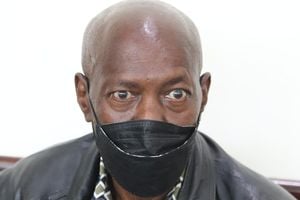
Former Kemri Director Davy Koech during a past appearance in court during the hearing of a graft case against him.
Dr Davy Koech was always impeccably dressed—at least during his reign at the helm of the Kenya Medical Research Institute (Kemri). Known for his ability to captivate audiences with his passionate oratory, he embodied the image of a relentless innovator. But behind this polished facade lay a shadowy world of questionable scientific endeavour, where the line between genuine breakthroughs and fantastical promises of miracle cures was blurred. His life, like his legacy, was a rich tapestry of brilliance, ambition and controversy.
When he died on Thursday, a name that once inspired both admiration and outrage was etched into the annals of history, leaving a legacy as intricate as it was infamous. He was in many ways a creation of Kemri, the institution that made him famous. Yet it was from this institution that he embarked on a scandal-ridden descent that culminated in his dramatic fall from grace.
In 1989, Dr Koech shot to international fame with a bold claim: he had discovered a 'miracle' drug, Kemron, which he claimed could reverse HIV status from positive to negative. The world was desperate for a cure and nobody was brave enough to make such a claim. But Dr Koech did. His announcement brought a glimmer of hope to many, but that hope was soon extinguished as it became clear that Kemron was little more than a mirage. Despite the growing scepticism of the scientific community, Koech's vast political network—including the endorsement of President Daniel arap Moi—ensured that the drug was hailed as a triumph of the scientific achievements of the Nyayo era.
For a time, Kemron was paraded as a beacon of Kenyan ingenuity – along the Nyayo Pioneer Car. But it wasn't long before the drug was exposed as part of a wider international Aids fraud scheme that preyed on the desperation of those affected by the disease. Despite the scandal, Dr Koech weathered the storm—his survival bolstered by the fact that in the political landscape of the Nyayo era, he was far from alone in peddling empty promises.
In the US, Dr Koech had found a ready market for Kemron, and it was marketed by the Amarillo Cell Culture Co. Inc. of Texas, which targeted the US black community. Its main champion was Louis Farrakhan, the founder of the Nation of Islam, who had visited Nairobi, met President Moi and toured Kemri. How much money was made from this venture was never known as Kemri was never audited by the government.
The Washington Post also identified New York's Abundant Life Clinic as a promoter of the drug after meeting Dr Koech, who took them on a tour of hospitals where they met with 'doctors' and 'patients'. Muhammad Justice, who owns the clinic with his wife Barbara, told the newspaper, "We talked to physicians, patients and the like. We were really convinced after 10 days that it was very effective."
Rather than publish its efficacy in a scientific journal, Dr Koech had made the announcement in Kemri’s newsletter, which headlined Kemron as "A Miracle Drug Against Aids". It claimed that "about 10 percent of the patients actually tested negative for the antibody that is associated with the Aids virus [and] the only side effect reported during the 10-month study was an increased appetite in the majority of patients." But this was central to what was later published in a scientific journal, claiming that “the research results [were] so uniformly positive, [they] seemed almost too good to be true,” according to a New York Times report.
In Nairobi, Kemron became a political symbol of progress, and Vice President and Finance Minister George Saitoti said the country would build a manufacturing plant for the drug. But clinical trials conducted by the World Health Organization did not yield the same results as Dr Koech had found, and with no capital to get the plant up and running, Kemri continued to be the purveyor of questionable Aids drugs, which then found their way back to the United States, according to a report in the Los Angeles Times.
The Kemron saga would be only the beginning of Dr Koech's association with scandal – and his love for sleaze would end with a stint in Kamiti Prison. After Kemron, Dr Koech would find himself embroiled in another controversial Aids scam, this time in partnership with Dr Stephen Herman, an American researcher who swindled hundreds of desperate patients out of their money. For $300 a month, these patients were sold a drug called Viroxan, which promised them a cure. Unbeknownst to many, Viroxan was being manufactured at Kemri under the supervision of Dr Koech, under a contract signed with Herman.
The US Congress, in a scathing report, described Dr Herman as a “modern-day snake oil salesman,” and revealed that “Dr Herman and this Kenyan scientist have contracted to commercially exploit the African and other third-world Aids patients with Viroxan.”
The congressional report also detailed how Viroxan was shipped from Kenya to distributors in the Bahamas and Tijuana, Mexico. The drug, which was never approved by any health authority, was marketed not only as a treatment for Aids but also for cancer and other diseases. When attempts to sell the rights to pharmaceutical companies failed, Dr Herman, ever the opportunist, "tried to sell it as disinfectant soap," according to the congressional findings. What worried Western observers was that under Dr Koech, Kemri had become an easy conduit.
According to the Los Angeles Times, although the US Food and Drug Administration had concluded that there was no evidence that Viroxan was effective against the Aids virus, the contract with Kemri would make the concoction available "to far more Aids patients than ever" before.
Although Dr Koech's involvement in the Viroxan affair was a poorly kept secret in international circles, it remained largely unspoken in Nairobi. But for those familiar with the congressional report, it became clear that under his leadership, Kemri had become a hub for fraudulent operations, where untested and unsafe drugs were manufactured and distributed around the world. His role, according to the report, was to conduct "human studies in Africa explicitly to help in their commercial promotion of the drug", mirroring the same unethical practices Herman had employed in the US.
A graduate of the University of Nairobi, where he obtained a Bachelor of Science degree in Chemistry and Zoology in 1974, and Duquesne University in Pittsburgh, Pennsylvania, Dr Koech went on to complete a PhD in Medical Pathology and Immunology at the University of Nairobi. It was during this time that Kemri was born and he became its pioneering director.
Part of his research team was Dr Arthur Obel, who would later charm Kenyans with his Aids 'cure', Pearl Omega. Before it was withdrawn from the market by the Ministry of Health, a bottle of Pearl Omega sold for Sh30,000.
Dr Koech was later accused of transferring, or stealing, Sh19.3 million from Kemri to his personal bank account. In a case that took 15 years to conclude, Dr Koech was sentenced to six years in prison and fined Sh19.6 million by Magistrate Victor Nakumile.
In September 2022, he failed to have the case reviewed and was forced to write to President William Ruto, begging for mercy. In his letter, Dr Koech expressed "profuse remorse" and said he had "suffered enough, having litigated for over 15 years".
He told the President: “Now at 71, and while incarcerated, my health, sir, has deteriorated. I have suffered a severe stroke and I am hypertensive. Medical doctors have determined that I am neither fit to stand trial nor am I able to instruct legal counsel…I have suffered depression…and I am now stuttering in my speech.”
A polygamist, Dr Koech has had many legal battles, some stemming from his properties and failure to pay school fees for his children. The court cases appear to have drained him of his last coin, and the Anti-Corruption agency had attached his properties, bringing the two families to court.
In the world of sleaze, Dr Koech was one of the unlucky few – he was caught and the case was concluded.
What had started as an illustrious career ended dramatically within the walls of Kamiti where he was saved by a presidential pardon after being pardoned by President Ruto.
In the academic world, Dr Koech authored numerous academic papers and built a reputation as a scholar with a wealth of knowledge. But how such a promising scholar became involved in sleaze, deception and exploitation of his position for personal gain is the untold story. For Koech, it is a story of brilliance intertwined with scandal. Once a fine and promising scholar, Dr Koech ended his career with a damaged legacy. A press release announcing his death was a classic statement of silence.
[email protected], on X-> @johnkamau1







